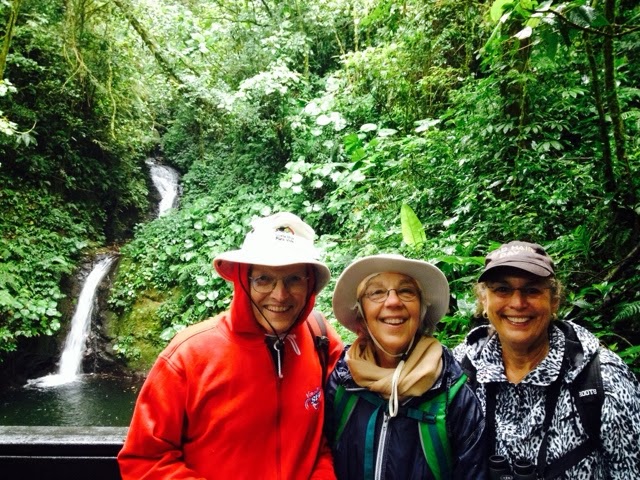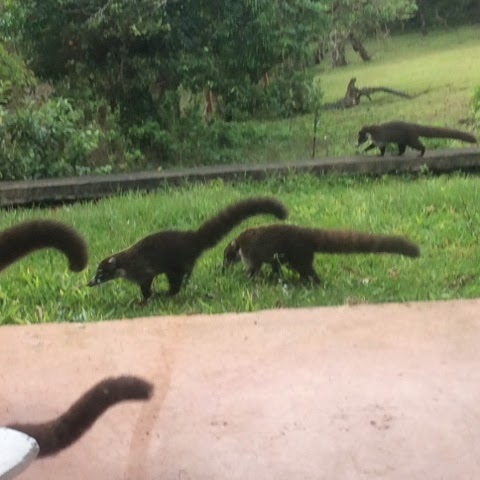One is not a drop in the ocean but an entire ocean in a single drop
What a wonderful world this is. Today was a day off school. I went with Liz and Don (my old pals from Argenta) on an early morning guided hike at the Monteverde Reserve which is the private reserve started by the Quakers at the instigation of George Powell (American botanist) in 1972 and is now leased to the Tropical Science Centre, a government sponsored organization...I think.... It's 4025 hectars and is one of the main places one can see Quetzals as well as many of the other indicator species of a tropical cloud forest. I gotta post some of the photos taken with my iPhone today. Not to be believed!
The intrepid hikers....there is a reason it is called a rain forest!
Stunningly, when we got off the old school bus that picks people up from St. Elena and winds through the village of Monteverde, guess who was waiting for us in a parking lot tree. A Quetzel! It sat there for at least 15 minutes. Wow. I was so busy looking I didn't take a photo. Here is a copy taken from a photo on the brochure. Seriously, it looks like this. Such a show off and it is actually way more fantastically beautifully turquoise than this photo. And the tail is at least 3'
One of the great things about an iPhone is that is easy to take photos through a spotting scope and so I did.
This is an Emerald Toucantte that was sitting in a tree. Hard to spot because it is so well camouflaged, save the yellow beak. This is a hummer (Green Crowned Brilliant) siting on her nest.
And a Blue Tailed Hummingbird. (Note to other birders there are over 50 hummers in this county)
There were endless more birds and orchids galore (there are over 400 species here), plus we smelled a pecori and saw an agouti run across the path and I saw my first white faced monkey (capuchins).
To better understand what is going on here, last night I attended a plenary session at the Monteverde Institute to hear a discussion how folks here want to better integrate all the different organizations who are doing research and/or managing conservation sites and/or doing some form of education (there are t least 8-10). Couple of highlights for me were that one scientist said that the Monteverde region has 50% of the species found in Costa Rica which has 2% of the species found globally or 0.015% of the species worldwide are found in this bio region. In other words the Monteverde region is amazingly diverse, almost uniquely so. Over 880 species of birds have been identified (more than the rest of North America combined) and similarly the number of epiphytes found here is well over 800 and. Have no clue as to the number of tropical trees but there are a lot. As a result the conference participants are talking about establishing a web based data base of plants, animals of and research in the region and creating a digital library. The participants were all very enthusiastic but I couldn't help but wonder who would take the responsibility to coordinate all the good ideas and research etc. each of the organizations spoke about. For example both Texas A&M and the U of Georga have programs here although at different elevations and there are several NGOs of varying expertise. Lots of egos and ecos at the table from my perspective. I didn't ask but I intend to head to the Institute later this week to find out. Perhaps Ticos follow through with their commitments but then there were several North Americans at the table.
My hesitancy aside, the other aspect that I found interesting is the amount of community support for conservation. I think much of it stems from the Quaker influence here in Monteverde but I also think the country in general has realized that Eco tourism could help build the economy...and it is more lucrative to have rich tourists come visit than it is to export pineapples and bananas.
Oh, another interesting aspect are the five threats these ecologists/educators identified in the region:
Climate change, of course, is the most publicized but
Increasing population impacts globally is seen as a major concern
Water supply (lots of water some of the year, drought in the dry season and no water catchment here or low flush toilets)
....one I can't remember ....and
Species extinction probably is seen as the most significant issue for this region (eg. 50% of amphibians and many endemic plants have completely disappeared in this bio region in the past 20 years)
So for somebody who said she was totally burnt out, feeling hopeless and not wanting to think about environmental/conservation issues and definitely not wanting to be involved in ecological issues at any level I find myself fascinated by what I have seen thus far and inspired to learn more.
And, I've totally missed the Russian Olympics.






Comments
Post a Comment